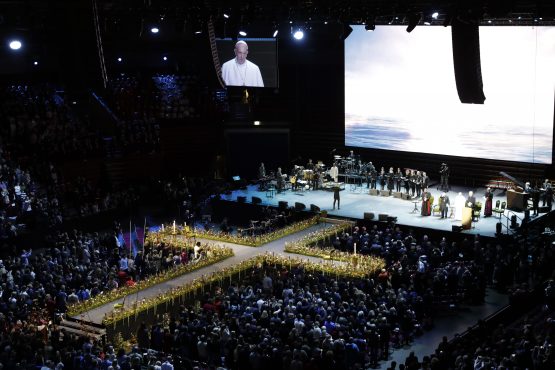
Nov 4, 2016 | Non categorizzato
 It might have been the presence of Pope Francis and of the highest representatives of the World Lutheran Federation. It might have been the moving words of the Joint Declaration being read in the Cathedral of Lund. Or it might have been the large turnout by the people. The fact is that the success of the 500th Anniversary of the Lutheran Reform went beyond every expectation. “Christ wants us to be one so that the world may believe,” Lutherans and Catholics proclaimed, convinced that “their way of relating with one another does have an effect on their witness to the Gospel.” The Declaration looks to the future and to daily life: moving beyond ourselves, our communities, our churches, to take action together “in service, in defence of human dignity and human rights, especially of the poor, working for justice and rejecting all forms of violence.” They agreed to work together “in welcoming the stranger and helping all those who have had to flee from war and persecution, to defend the rights of refugees and those seeking asylum.” They agreed to work together for the protection of Creation “that suffers from exploitation and the effects of insatiable greed.” The Declaration became global in its final appeal to Catholics and Lutherans of the whole world that “in every parish and Lutheran and Catholic community” they might be “courageous and creative,” completely forgetting conflicts of the past so that “the unity among us might guide our collaboration and deepen our solidarity.” The Lutheran Reform in Sweden was introduced for simply political reasons. King Gustav Vasa took control of the Church, and it was only in the year 2000 that the separation between Church and State took place. Over the course of the centuries Lutheranism acquired many characteristics that were then had a reflection on nations. But beyond the history of individual nations, today are witnessing the “Unity Reform” that is overwhelmingly desired by both the Catholic and Lutheran Church. This reform is also destined to become part of popular culture. It is founded on 5 commitments: 1) to begin from the perspective of our unity, not from the perspective of divisions; 2) to allow ourselves to be continually transformed by the encounter with the other; 3) to take concrete steps in seeking full visible unity; 4) to rediscover the power of the Gospel; 5) to offer a common witness to God’s mercy. Such commitments enable us to bear witness to the beauty of being Christians in diversity, because of the fact that what unites us is much more than what divides us. This has always been the guiding belief behind the long friendship between the Focolare and the Lutherans. Antje Jackelen, the first woman archbishop of the Lutheran Church of Sweden was interviewed by us regarding the contribution of the movements. She said that “they are ecumenical in their very design, so that with them any prejudices have already been beaten.” She also said that this week’s event “is also the result of 50 years of dialoguing and working together.” That afternoon at Malmö Arena in front of a crowd of 10.000 people, Pranita from India, Hector Fabio from Colombia, Marguerite from Burundi, Rose from South Sudan and Antoine from Syria shared their testimonies. They were able to demonstrate more than a thousand speeches the collaboration among the Churches through common efforts for the protection of Creation, social justice, children, the poor, farm workers and the victim of war. The Pope concluded: “These stories inspire us and give new motivation to our desire to be always more united. When we return home let’s take with us the commitment to do one act of peace and reconciliation each day, in order to be courageous and faithful witnesses of Christian hope.” JOINT STATEMENT on the occasion of the Joint Catholic-Lutheran Commemoration of the Reformation ( From Vatican radio)
It might have been the presence of Pope Francis and of the highest representatives of the World Lutheran Federation. It might have been the moving words of the Joint Declaration being read in the Cathedral of Lund. Or it might have been the large turnout by the people. The fact is that the success of the 500th Anniversary of the Lutheran Reform went beyond every expectation. “Christ wants us to be one so that the world may believe,” Lutherans and Catholics proclaimed, convinced that “their way of relating with one another does have an effect on their witness to the Gospel.” The Declaration looks to the future and to daily life: moving beyond ourselves, our communities, our churches, to take action together “in service, in defence of human dignity and human rights, especially of the poor, working for justice and rejecting all forms of violence.” They agreed to work together “in welcoming the stranger and helping all those who have had to flee from war and persecution, to defend the rights of refugees and those seeking asylum.” They agreed to work together for the protection of Creation “that suffers from exploitation and the effects of insatiable greed.” The Declaration became global in its final appeal to Catholics and Lutherans of the whole world that “in every parish and Lutheran and Catholic community” they might be “courageous and creative,” completely forgetting conflicts of the past so that “the unity among us might guide our collaboration and deepen our solidarity.” The Lutheran Reform in Sweden was introduced for simply political reasons. King Gustav Vasa took control of the Church, and it was only in the year 2000 that the separation between Church and State took place. Over the course of the centuries Lutheranism acquired many characteristics that were then had a reflection on nations. But beyond the history of individual nations, today are witnessing the “Unity Reform” that is overwhelmingly desired by both the Catholic and Lutheran Church. This reform is also destined to become part of popular culture. It is founded on 5 commitments: 1) to begin from the perspective of our unity, not from the perspective of divisions; 2) to allow ourselves to be continually transformed by the encounter with the other; 3) to take concrete steps in seeking full visible unity; 4) to rediscover the power of the Gospel; 5) to offer a common witness to God’s mercy. Such commitments enable us to bear witness to the beauty of being Christians in diversity, because of the fact that what unites us is much more than what divides us. This has always been the guiding belief behind the long friendship between the Focolare and the Lutherans. Antje Jackelen, the first woman archbishop of the Lutheran Church of Sweden was interviewed by us regarding the contribution of the movements. She said that “they are ecumenical in their very design, so that with them any prejudices have already been beaten.” She also said that this week’s event “is also the result of 50 years of dialoguing and working together.” That afternoon at Malmö Arena in front of a crowd of 10.000 people, Pranita from India, Hector Fabio from Colombia, Marguerite from Burundi, Rose from South Sudan and Antoine from Syria shared their testimonies. They were able to demonstrate more than a thousand speeches the collaboration among the Churches through common efforts for the protection of Creation, social justice, children, the poor, farm workers and the victim of war. The Pope concluded: “These stories inspire us and give new motivation to our desire to be always more united. When we return home let’s take with us the commitment to do one act of peace and reconciliation each day, in order to be courageous and faithful witnesses of Christian hope.” JOINT STATEMENT on the occasion of the Joint Catholic-Lutheran Commemoration of the Reformation ( From Vatican radio)
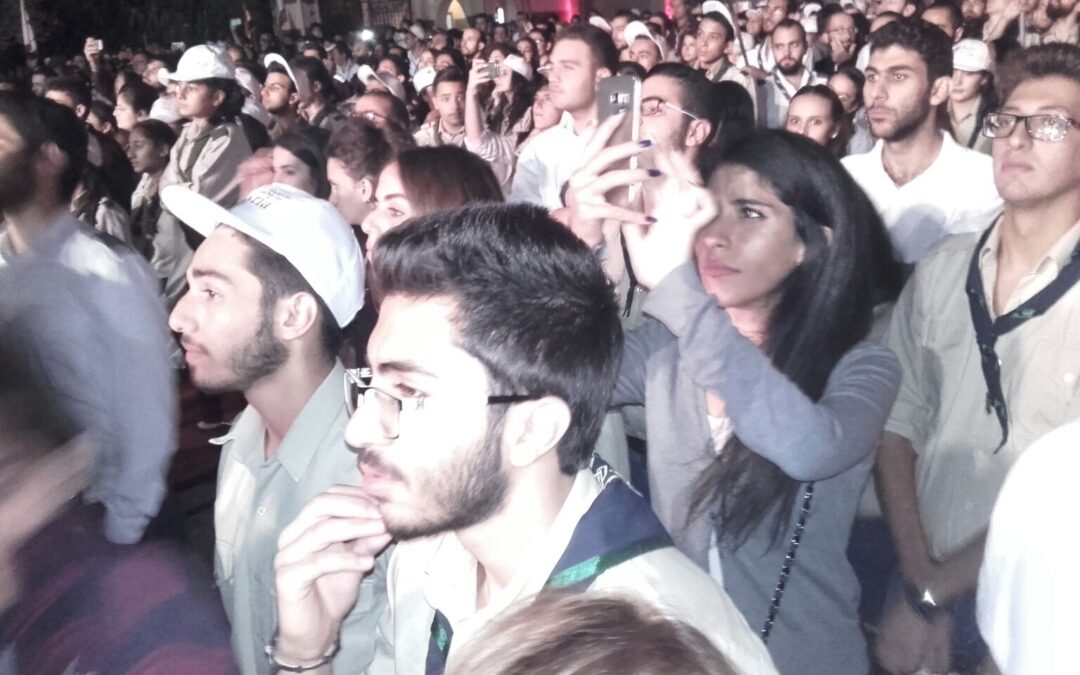
Nov 4, 2016 | Non categorizzato
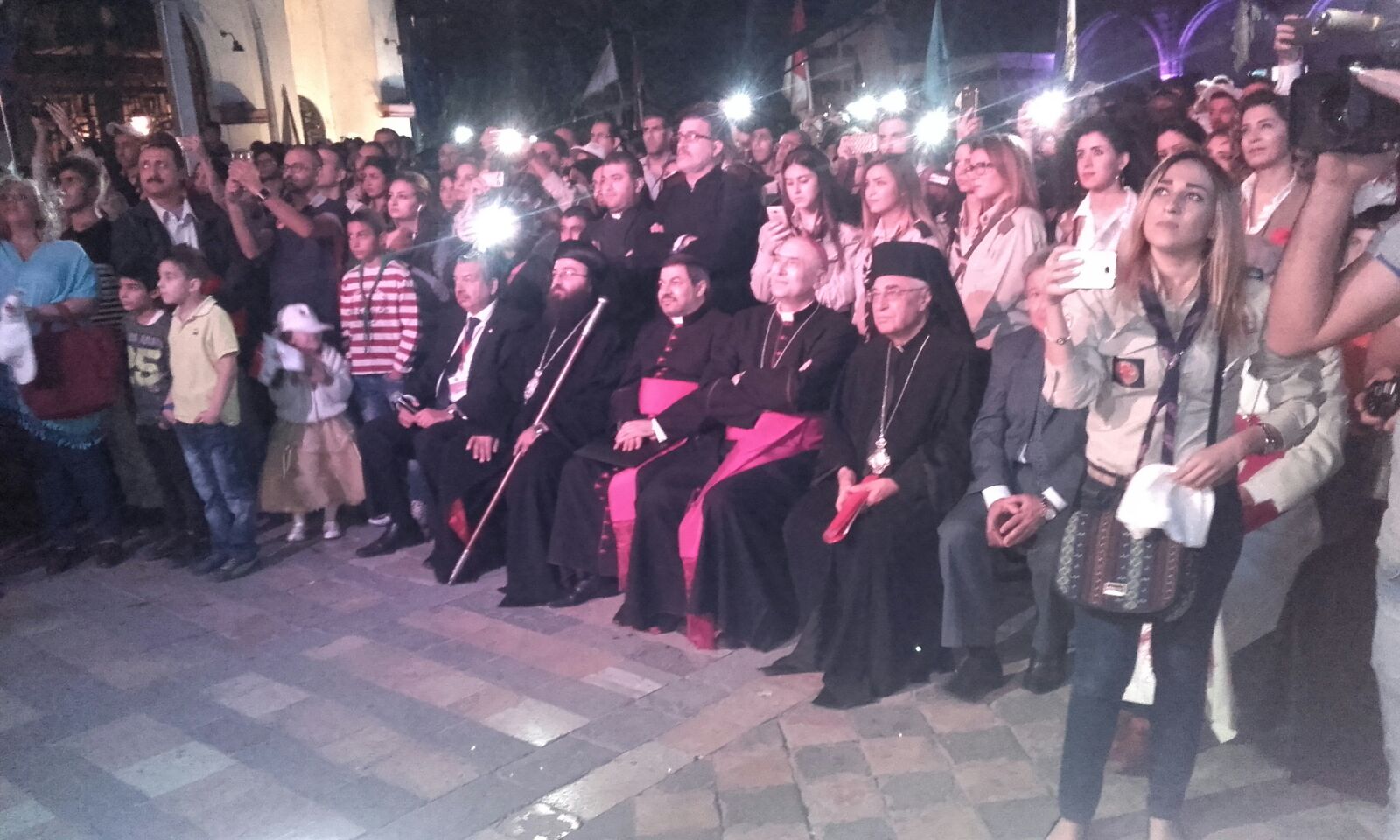 Greatly committed to assisting the civil population martyred by war that has dragged on for five years now, last 31 October, Caritas Internationalis called for a world day of prayer for Syria. Simultaneously, Pope Francis and other religious leaders prayed together for peace in the Middle East and particularly for the Syrian people, when they gathered in Sweden for the opening of the celebrations for the 500th anniversary of the Reform. «While the people are suffering, incredible sums of money are spent to supply the combatants, and some of these countries that furnish the arms are also those that advocate peace. How can we believe in those who caress with their right hand and strike you with the left??» This was Pope Francis’s admonishment in his impelling video message in support of the campaign promoted by Caritas Internationalis. After encouraging all to live the Year of Mercy with determination, the Holy Father forcefully underlined that “peace in Syria is possible,” and invited the church groups, parishes, and communities to promote all possible awareness campaigns «to spread a message of peace, unity and hope». And added: «After prayer, let works of peace ensue».
Greatly committed to assisting the civil population martyred by war that has dragged on for five years now, last 31 October, Caritas Internationalis called for a world day of prayer for Syria. Simultaneously, Pope Francis and other religious leaders prayed together for peace in the Middle East and particularly for the Syrian people, when they gathered in Sweden for the opening of the celebrations for the 500th anniversary of the Reform. «While the people are suffering, incredible sums of money are spent to supply the combatants, and some of these countries that furnish the arms are also those that advocate peace. How can we believe in those who caress with their right hand and strike you with the left??» This was Pope Francis’s admonishment in his impelling video message in support of the campaign promoted by Caritas Internationalis. After encouraging all to live the Year of Mercy with determination, the Holy Father forcefully underlined that “peace in Syria is possible,” and invited the church groups, parishes, and communities to promote all possible awareness campaigns «to spread a message of peace, unity and hope». And added: «After prayer, let works of peace ensue». 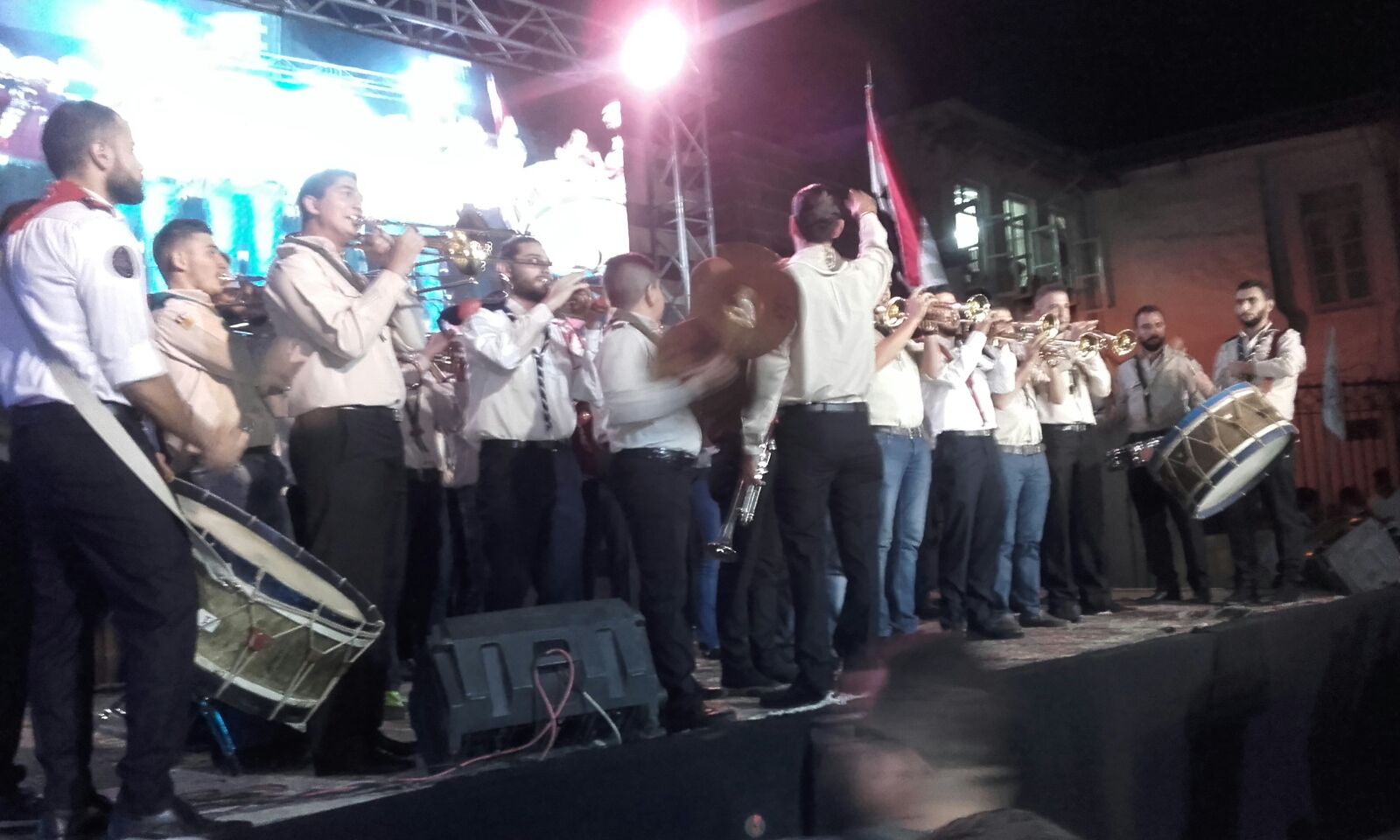 Many communities responded to the Pope’s appeal, especially the Christian community of Damascus, which gathered in prayer last Sunday, 30 October, believing in the force of prayer in asking for the gift of peace. Some members of the Focolare community who took part wrote: «We were there in the midst of a fully packed Church: the faithful of all the churches, Catholics, Orthodox and Evangelicals, the Apostolic Nuncio and some bishops. In those moments, more than ever, we felt the force of prayer, that unity is tangible, and there is strong hope that peace will soon be established. At the end of the prayer, the scouts coming from all over Syria presented some documentaries on peace in the square, and with songs, made us experience a moment of joy, with fireworks and launching of balloons.»
Many communities responded to the Pope’s appeal, especially the Christian community of Damascus, which gathered in prayer last Sunday, 30 October, believing in the force of prayer in asking for the gift of peace. Some members of the Focolare community who took part wrote: «We were there in the midst of a fully packed Church: the faithful of all the churches, Catholics, Orthodox and Evangelicals, the Apostolic Nuncio and some bishops. In those moments, more than ever, we felt the force of prayer, that unity is tangible, and there is strong hope that peace will soon be established. At the end of the prayer, the scouts coming from all over Syria presented some documentaries on peace in the square, and with songs, made us experience a moment of joy, with fireworks and launching of balloons.» 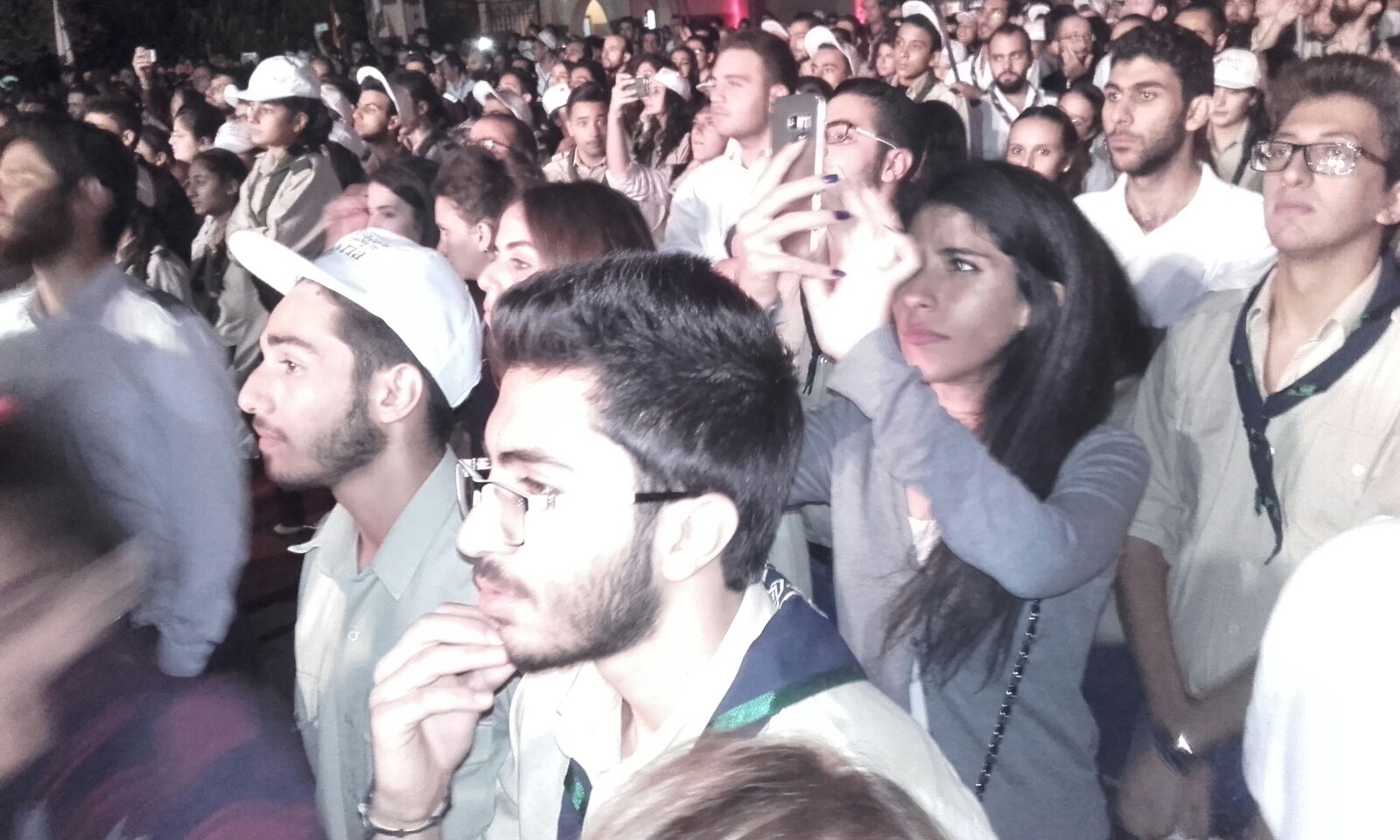 “Syria: peace is possible,” was thus Pope Francis’s invitation to all the faithful and people of good will; and an invitation to address «those who are involved in peace negotiations so that they take these agreements seriously and commit themselves to facilitating the humanitarian aid.» And he concluded: «Let’s join forces at all levels, to make peace in our beloved Syria possible.» Consult the Caritas Syria site (http://syria.caritas.org/)where all the materials to sign up and diffuse the peace campaign for Syria are available. #peacepossible4syria
“Syria: peace is possible,” was thus Pope Francis’s invitation to all the faithful and people of good will; and an invitation to address «those who are involved in peace negotiations so that they take these agreements seriously and commit themselves to facilitating the humanitarian aid.» And he concluded: «Let’s join forces at all levels, to make peace in our beloved Syria possible.» Consult the Caritas Syria site (http://syria.caritas.org/)where all the materials to sign up and diffuse the peace campaign for Syria are available. #peacepossible4syria
Nov 3, 2016 | Non categorizzato
Subsequent to the congress held on 27-29 January 2017, a second edition will be held at the International Mariapolis Centre in Castel Gandolfo (Rome) on 6-8 April 2017 from Thursday morning to Saturday lunch. Arrival can be on 4th April, or the evening 5th April (for those who have requested, there is the possibility to participate in the audience with Pope Francis on Wednesday 5th April). The theme of the Congress: “Jesus Forsaken: Window of God; Window for humanity”.
Nov 3, 2016 | Non categorizzato
Castel Gandolfo, Italy. Two congresses for adherents of the Focolare Movement, January 27-29, 2017 (Friday morning to Sunday after lunch). Arrival: evening of January 26, 2017. April 6-8, 2017 (Thursday morning to Saturday after lunch). Arrival: April 4 or 5 evening (including attending the Pope’s audience on April 5, for those who have asked). The theme of both congresses will be: “Jesus Forsaken, God’s window on the world and the world’s window on God.”
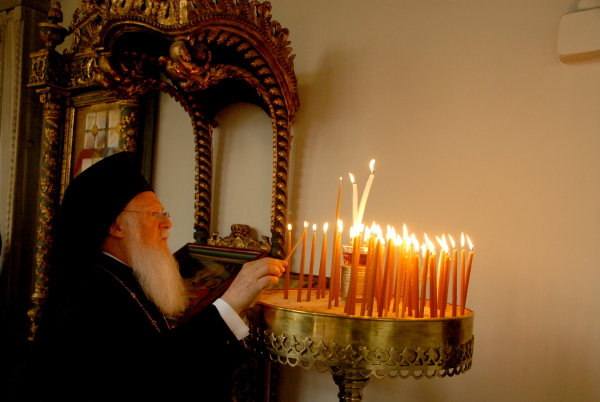
Nov 3, 2016 | Non categorizzato
 On October 22, 1991 the Holy Synod of the Greek Orthodox Church unanimously chose him to be the Archbishop of Constantinople- New Rome and Ecumenical Patriarch. The newly elected Patriarch had known Chiara Lubich in the years when he was a deacon studying in Rome and in the many visits Chiara made to Istanbul on visit to Patriarch Athenagoras and Patriarch Demetrius. He was present at several of those meetings and inherited from Athenagoras his zeal for unity of the Church, which Chiara ardently longed for. Their spiritual friendship and communion grew over the years. The Patriarch visited Chiara at Gemelli Hospital in Rome and blessed her a few days before her death. In 2015 he visited Loppiano where he recieved the first “Culture of Unity” honorary doctorate from Sophia University Institute. A month later he was in Halki, Istanbul, welcoming the 34th ecumenical meeting of Bishop Friends of the Focolare.
On October 22, 1991 the Holy Synod of the Greek Orthodox Church unanimously chose him to be the Archbishop of Constantinople- New Rome and Ecumenical Patriarch. The newly elected Patriarch had known Chiara Lubich in the years when he was a deacon studying in Rome and in the many visits Chiara made to Istanbul on visit to Patriarch Athenagoras and Patriarch Demetrius. He was present at several of those meetings and inherited from Athenagoras his zeal for unity of the Church, which Chiara ardently longed for. Their spiritual friendship and communion grew over the years. The Patriarch visited Chiara at Gemelli Hospital in Rome and blessed her a few days before her death. In 2015 he visited Loppiano where he recieved the first “Culture of Unity” honorary doctorate from Sophia University Institute. A month later he was in Halki, Istanbul, welcoming the 34th ecumenical meeting of Bishop Friends of the Focolare.  Therefore, this anniversary is also an occasion of celebration for the entire Focolare family. It is difficult to summarize these “blest 15 years” of patient, dauntless, meek and generous toil,” as Maria Voce referred to them in her message. She expressed sentiments of “gratitude to God for the gifts that He had bestowed on this Patriarch who has been an illuminated guide for His Church,” but also for “engaging many others in thought and in concrete action (…) in favour of life, the Creation, dialogue, peace and universal brotherhood.” There was great celebrating at the Patriarchal Church of Saint George in Istanbul which culminated in the Divine Liturgy. In modern Greek “efcharistó” is the word used to say “thank you.” And it seems nothing better could have expressed the thanksgiving to God for the gift that He has given to the Church and to the world in this man. In the presence of numerous metropolitans from several countries who are linked to the Ecumenical Patriarchate, the Apostolic Vicar Rubén Tierrablanca of Istanbul, and Mufti Dede Bektaşi from Albania – the Patriarch spoke about these years, in words full of humility and gratitude.
Therefore, this anniversary is also an occasion of celebration for the entire Focolare family. It is difficult to summarize these “blest 15 years” of patient, dauntless, meek and generous toil,” as Maria Voce referred to them in her message. She expressed sentiments of “gratitude to God for the gifts that He had bestowed on this Patriarch who has been an illuminated guide for His Church,” but also for “engaging many others in thought and in concrete action (…) in favour of life, the Creation, dialogue, peace and universal brotherhood.” There was great celebrating at the Patriarchal Church of Saint George in Istanbul which culminated in the Divine Liturgy. In modern Greek “efcharistó” is the word used to say “thank you.” And it seems nothing better could have expressed the thanksgiving to God for the gift that He has given to the Church and to the world in this man. In the presence of numerous metropolitans from several countries who are linked to the Ecumenical Patriarchate, the Apostolic Vicar Rubén Tierrablanca of Istanbul, and Mufti Dede Bektaşi from Albania – the Patriarch spoke about these years, in words full of humility and gratitude.  Msgr Nicholas Wyrwoll presented a summary of the past quarter of a century under the guidance of the Patriarch: “Many things changed. Bartholomew is now overwhelmingly recognized as the Ecumenical Patriarch, a title that could not be mentioned even within the liturgy. The change in the Holy Synod was noteworthy, which is the most important governing body of the Byzantine Church. Previously the members came from all of Turkey, now they come from the entire world and alternate every six months. He was able to involve the small remaining Greek community in Turkey and the Turkish authorities in the restoration of many churches and monasteries, cherishing and preserving the Christian patrimony of that land. He has shown concern for the protection of Creation. He has collaborated with all the religions. He is a world leader that is listened to. In the homily the Patriarch underscored the importance of dialogue and of communion: “We are from different cultures, different histories, different experiences,” he stated “a common expression of the faith is not to be found with words, but with prayer in common.” He also extended warm greetings to the Mufti from Albania. He convened the Panorthodox Synod in Crete. With this Patriarch, the quest for unity within the Church, especially with the Roman Catholic Church, has gone ahead in leaps and bounds.
Msgr Nicholas Wyrwoll presented a summary of the past quarter of a century under the guidance of the Patriarch: “Many things changed. Bartholomew is now overwhelmingly recognized as the Ecumenical Patriarch, a title that could not be mentioned even within the liturgy. The change in the Holy Synod was noteworthy, which is the most important governing body of the Byzantine Church. Previously the members came from all of Turkey, now they come from the entire world and alternate every six months. He was able to involve the small remaining Greek community in Turkey and the Turkish authorities in the restoration of many churches and monasteries, cherishing and preserving the Christian patrimony of that land. He has shown concern for the protection of Creation. He has collaborated with all the religions. He is a world leader that is listened to. In the homily the Patriarch underscored the importance of dialogue and of communion: “We are from different cultures, different histories, different experiences,” he stated “a common expression of the faith is not to be found with words, but with prayer in common.” He also extended warm greetings to the Mufti from Albania. He convened the Panorthodox Synod in Crete. With this Patriarch, the quest for unity within the Church, especially with the Roman Catholic Church, has gone ahead in leaps and bounds.
Nov 2, 2016 | Non categorizzato

 It might have been the presence of Pope Francis and of the highest representatives of the World Lutheran Federation. It might have been the moving words of the Joint Declaration being read in the Cathedral of Lund. Or it might have been the large turnout by the people. The fact is that the success of the 500th Anniversary of the Lutheran Reform went beyond every expectation. “Christ wants us to be one so that the world may believe,” Lutherans and Catholics proclaimed, convinced that “their way of relating with one another does have an effect on their witness to the Gospel.” The Declaration looks to the future and to daily life: moving beyond ourselves, our communities, our churches, to take action together “in service, in defence of human dignity and human rights, especially of the poor, working for justice and rejecting all forms of violence.” They agreed to work together “in welcoming the stranger and helping all those who have had to flee from war and persecution, to defend the rights of refugees and those seeking asylum.” They agreed to work together for the protection of Creation “that suffers from exploitation and the effects of insatiable greed.” The Declaration became global in its final appeal to Catholics and Lutherans of the whole world that “in every parish and Lutheran and Catholic community” they might be “courageous and creative,” completely forgetting conflicts of the past so that “the unity among us might guide our collaboration and deepen our solidarity.” The Lutheran Reform in Sweden was introduced for simply political reasons. King Gustav Vasa took control of the Church, and it was only in the year 2000 that the separation between Church and State took place. Over the course of the centuries Lutheranism acquired many characteristics that were then had a reflection on nations. But beyond the history of individual nations, today are witnessing the “Unity Reform” that is overwhelmingly desired by both the Catholic and Lutheran Church. This reform is also destined to become part of popular culture. It is founded on 5 commitments: 1) to begin from the perspective of our unity, not from the perspective of divisions; 2) to allow ourselves to be continually transformed by the encounter with the other; 3) to take concrete steps in seeking full visible unity; 4) to rediscover the power of the Gospel; 5) to offer a common witness to God’s mercy. Such commitments enable us to bear witness to the beauty of being Christians in diversity, because of the fact that what unites us is much more than what divides us. This has always been the guiding belief behind the long friendship between the Focolare and the Lutherans. Antje Jackelen, the first woman archbishop of the Lutheran Church of Sweden was interviewed by us regarding the contribution of the movements. She said that “they are ecumenical in their very design, so that with them any prejudices have already been beaten.” She also said that this week’s event “is also the result of 50 years of dialoguing and working together.” That afternoon at Malmö Arena in front of a crowd of 10.000 people, Pranita from India, Hector Fabio from Colombia, Marguerite from Burundi, Rose from South Sudan and Antoine from Syria shared their testimonies. They were able to demonstrate more than a thousand speeches the collaboration among the Churches through common efforts for the protection of Creation, social justice, children, the poor, farm workers and the victim of war. The Pope concluded: “These stories inspire us and give new motivation to our desire to be always more united. When we return home let’s take with us the commitment to do one act of peace and reconciliation each day, in order to be courageous and faithful witnesses of Christian hope.” JOINT STATEMENT on the occasion of the Joint Catholic-Lutheran Commemoration of the Reformation ( From Vatican radio)
It might have been the presence of Pope Francis and of the highest representatives of the World Lutheran Federation. It might have been the moving words of the Joint Declaration being read in the Cathedral of Lund. Or it might have been the large turnout by the people. The fact is that the success of the 500th Anniversary of the Lutheran Reform went beyond every expectation. “Christ wants us to be one so that the world may believe,” Lutherans and Catholics proclaimed, convinced that “their way of relating with one another does have an effect on their witness to the Gospel.” The Declaration looks to the future and to daily life: moving beyond ourselves, our communities, our churches, to take action together “in service, in defence of human dignity and human rights, especially of the poor, working for justice and rejecting all forms of violence.” They agreed to work together “in welcoming the stranger and helping all those who have had to flee from war and persecution, to defend the rights of refugees and those seeking asylum.” They agreed to work together for the protection of Creation “that suffers from exploitation and the effects of insatiable greed.” The Declaration became global in its final appeal to Catholics and Lutherans of the whole world that “in every parish and Lutheran and Catholic community” they might be “courageous and creative,” completely forgetting conflicts of the past so that “the unity among us might guide our collaboration and deepen our solidarity.” The Lutheran Reform in Sweden was introduced for simply political reasons. King Gustav Vasa took control of the Church, and it was only in the year 2000 that the separation between Church and State took place. Over the course of the centuries Lutheranism acquired many characteristics that were then had a reflection on nations. But beyond the history of individual nations, today are witnessing the “Unity Reform” that is overwhelmingly desired by both the Catholic and Lutheran Church. This reform is also destined to become part of popular culture. It is founded on 5 commitments: 1) to begin from the perspective of our unity, not from the perspective of divisions; 2) to allow ourselves to be continually transformed by the encounter with the other; 3) to take concrete steps in seeking full visible unity; 4) to rediscover the power of the Gospel; 5) to offer a common witness to God’s mercy. Such commitments enable us to bear witness to the beauty of being Christians in diversity, because of the fact that what unites us is much more than what divides us. This has always been the guiding belief behind the long friendship between the Focolare and the Lutherans. Antje Jackelen, the first woman archbishop of the Lutheran Church of Sweden was interviewed by us regarding the contribution of the movements. She said that “they are ecumenical in their very design, so that with them any prejudices have already been beaten.” She also said that this week’s event “is also the result of 50 years of dialoguing and working together.” That afternoon at Malmö Arena in front of a crowd of 10.000 people, Pranita from India, Hector Fabio from Colombia, Marguerite from Burundi, Rose from South Sudan and Antoine from Syria shared their testimonies. They were able to demonstrate more than a thousand speeches the collaboration among the Churches through common efforts for the protection of Creation, social justice, children, the poor, farm workers and the victim of war. The Pope concluded: “These stories inspire us and give new motivation to our desire to be always more united. When we return home let’s take with us the commitment to do one act of peace and reconciliation each day, in order to be courageous and faithful witnesses of Christian hope.” JOINT STATEMENT on the occasion of the Joint Catholic-Lutheran Commemoration of the Reformation ( From Vatican radio)

 Greatly committed to assisting the civil population martyred by war that has dragged on for five years now, last 31 October, Caritas Internationalis called for a world day of prayer for Syria. Simultaneously, Pope Francis and other religious leaders prayed
Greatly committed to assisting the civil population martyred by war that has dragged on for five years now, last 31 October, Caritas Internationalis called for a world day of prayer for Syria. Simultaneously, Pope Francis and other religious leaders prayed  Many communities responded to the Pope’s appeal, especially the Christian community of Damascus, which gathered in prayer last Sunday, 30 October, believing in the force of prayer in asking for the gift of peace. Some members of the Focolare community who took part wrote: «We were there in the midst of a fully packed Church: the faithful of all the churches, Catholics, Orthodox and Evangelicals, the Apostolic Nuncio and some bishops. In those moments, more than ever, we felt the force of prayer, that unity is tangible, and there is strong hope that peace will soon be established. At the end of the prayer, the scouts coming from all over Syria presented some documentaries on peace in the square, and with songs, made us experience a moment of joy, with fireworks and launching of balloons.»
Many communities responded to the Pope’s appeal, especially the Christian community of Damascus, which gathered in prayer last Sunday, 30 October, believing in the force of prayer in asking for the gift of peace. Some members of the Focolare community who took part wrote: «We were there in the midst of a fully packed Church: the faithful of all the churches, Catholics, Orthodox and Evangelicals, the Apostolic Nuncio and some bishops. In those moments, more than ever, we felt the force of prayer, that unity is tangible, and there is strong hope that peace will soon be established. At the end of the prayer, the scouts coming from all over Syria presented some documentaries on peace in the square, and with songs, made us experience a moment of joy, with fireworks and launching of balloons.»  “Syria: peace is possible,” was thus Pope Francis’s invitation to all the faithful and people of good will; and an invitation to address «those who are involved in peace negotiations so that they take these agreements seriously and commit themselves to facilitating the humanitarian aid.» And he concluded: «Let’s join forces at all levels, to make peace in our beloved Syria possible.» Consult the Caritas Syria site (
“Syria: peace is possible,” was thus Pope Francis’s invitation to all the faithful and people of good will; and an invitation to address «those who are involved in peace negotiations so that they take these agreements seriously and commit themselves to facilitating the humanitarian aid.» And he concluded: «Let’s join forces at all levels, to make peace in our beloved Syria possible.» Consult the Caritas Syria site (
 On October 22, 1991 the Holy Synod of the Greek Orthodox Church unanimously chose him to be the Archbishop of Constantinople- New Rome and Ecumenical Patriarch. The newly elected Patriarch had known
On October 22, 1991 the Holy Synod of the Greek Orthodox Church unanimously chose him to be the Archbishop of Constantinople- New Rome and Ecumenical Patriarch. The newly elected Patriarch had known  Therefore, this anniversary is also an occasion of celebration for the entire Focolare family. It is difficult to summarize these “blest 15 years” of patient, dauntless, meek and generous toil,” as
Therefore, this anniversary is also an occasion of celebration for the entire Focolare family. It is difficult to summarize these “blest 15 years” of patient, dauntless, meek and generous toil,” as